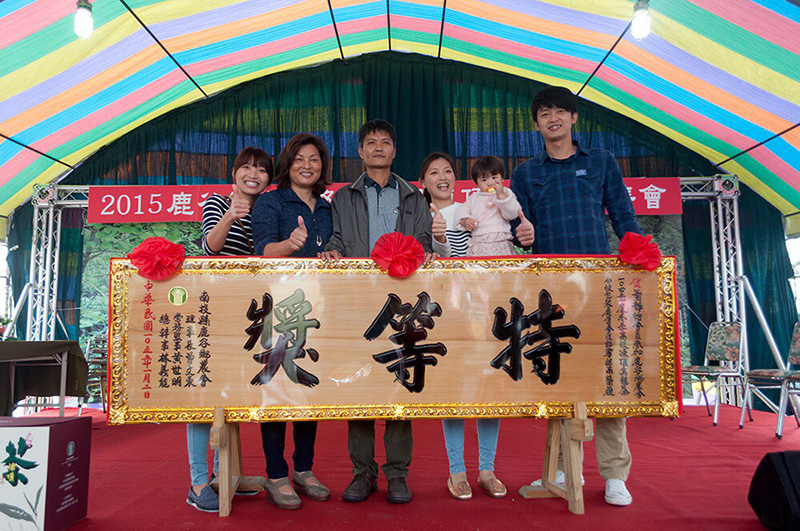1. Tell us about yourself and your farming journey.
At our tea garden, we are passionate about crafting exceptional oolong teas, grown and processed in our Da'an area, Nantou County. Over the years, we’ve focused on traditional farming methods while embracing innovative techniques. Our dedication to quality and authenticity has earned us recognition, including prestigious tea awards, and we continue to share our love for Taiwanese tea with the world.
2. How long have you been farming tea?
Our tea farm has been in the family since 1978, with a long-standing tradition of producing high-quality oolong teas. For over four decades, we’ve worked to perfect our cultivation and processing methods, passing down our knowledge and passion through generations. It’s a family legacy that continues to thrive as we adapt to new challenges and continue to share our exceptional teas with the world.
3. What motivated you to start cultivating tea specifically?
Growing up in Taiwan, I was always inspired by the rich tea culture here. I was drawn to oolong tea because of its deep history and incredible flavor profiles. I wanted to create a tea farm that could showcase the purity and richness of Taiwanese teas, like our Honey Oolong, while contributing to the heritage of our local community.
4. Can you describe the process of growing and processing tea and what makes your farm unique?
Our process starts with planting in the rich soil of the Da'an area, high in the mountains, where the climate and elevation help our teas flourish. We focus on sustainable, small-batch production, from hand-picking leaves to traditional processing methods. Our farm is unique because we control every step, from cultivation to final packaging, ensuring a premium experience with each cup.
5. What is the most important thing for your customers to know about your farm?
We pride ourselves on the authenticity and quality of our teas, from Honey Oolong to competition-grade varieties. Every leaf is carefully grown in our pristine environment and processed with precision. When you buy our tea, you’re not just getting a product; you’re supporting a tradition that values craftsmanship, sustainability, and the preservation of Taiwan’s tea legacy.
6. What are the main challenges you face in farming tea? Has that changed over time?
In recent years, extreme climate changes and droughts have severely affected our water resources in the mountains. To address this, we successfully ventured into cutting down the valley to find new water sources for irrigation. Additionally, the long sunshine periods have caused the tea leaves to grow rapidly, making harvests from both high and low altitudes occur at similar times. This leads to significant labor shortages, and arranging enough manpower has become a major challenge. These extreme conditions not only impact crop growth but also require us to adapt our tea-making processes continuously.
7. What are your current distribution channels and what challenges do you face in reaching the market?
Currently, we distribute our teas both locally in Taiwan and internationally through online platforms. The biggest challenge is educating consumers about the unique flavors of our teas and the care that goes into each batch. We want our customers to know that buying from us isn’t just about the tea—it’s about the story and tradition behind every sip.
8. What are your future plans for farming? Anything that you'd like to share about your dreams and aspirations?
We are focused on expanding our offerings while maintaining our commitment to small-batch production and sustainability. Our dream is to see our tea label become a globally recognized name, bringing Taiwan’s best teas to more customers worldwide. We hope to further integrate eco-friendly practices and continuously improve the quality of our teas.
9. How has farming tea impacted your life and the lives of those in your community?
Farming tea has allowed me to support my family and community, providing local jobs and contributing to the regional economy. The rewards go beyond financial success—it's about preserving a cultural tradition while fostering a deep connection to the land. The farm has become a hub for learning and community development.
10. What do you enjoy most about farming? Any advice for young farmers getting started?
The joy of farming lies in seeing each tea leaf grow and evolve. It’s a slow, steady process that rewards patience. For young farmers, my advice is simple: start with passion, invest in learning the craft, and don’t rush. The journey may be long, but it’s incredibly fulfilling.
11. What is your favorite tea and are there any tips you can give on how to best brew your tea?
I’m particularly fond of our Honey Oolong for its sweet, floral notes. For the best brewing experience, use water around 85-90°C (185-194°F) and steep for about 2-3 minutes. I recommend multiple infusions—each steeping reveals new layers of flavor, which makes it a wonderfully complex tea.

